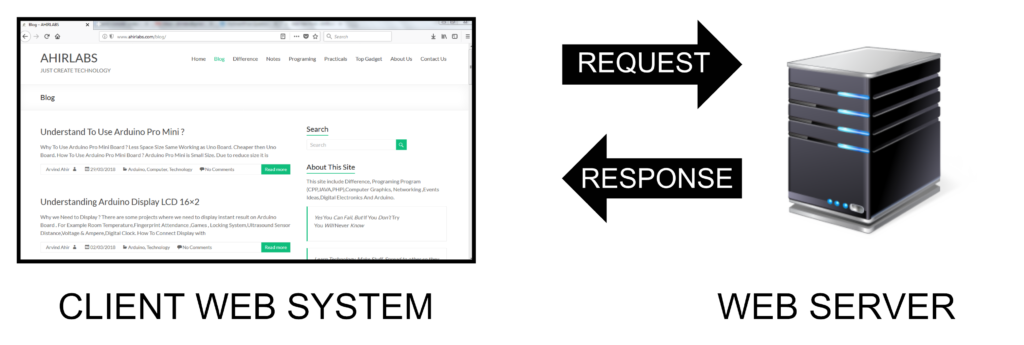What is a Server ?
A server is similar to computer, a device that works on network resources.it responses 365 Days 24/7 Hrs every request by user it has to response. it may be within a local network or it may be out of local network. there are several “Servers ” categories or types of server which define it’s working.
Where we use Server ?
We use in Network area where we need 24/7 Hrs 1000’s Users are requesting same information or different in real time. Like Website, Web Portal, Cloud Storage etc.
Why we call it Server not a Computer ?
A computer is single user request response Example ( a user need some document in a computer it opens and views on single screen) on other hand server used in a network responses the more over 100+ Same request Example (Multiple user can view same Document without any Trouble on its own devices)
Reason why we call it Servers
-> Both devices are same but it different by it’s working. That’s why we call by it’s working.
-> Computer is Less Configuration , Whereas Server is High Configuration in Shared Network.
-> Server is Fixed at One place it not Moves again & again , But Computer,Laptop & Mobile are shifted its location.
How Severs Works ?
Any Servers works nearly Similar Its Response to the Request , Any Users Request Some Data in the form of HTTPS the Server Response to it in the Same Manner If data finds its show else it Response some errors which data not found you request.
In Above Diagram it represent the Web Servers Working. The page Request Response the by the Server. the Simple Static Page Without Database.
In Above Diagram it represent the Web Servers Working With Database. The Dynamic Website Required Database for Records information data for more lite site. In this Page is Process in Web Server and added with data and then Its goes back to Client System.Its too fast process . sometime we received server cache page.
Different Types of Servers
Servers are defines by its working of server tasks jobs.
| 1. Print Servers 2. File Servers 3. Database Servers. 4. Proxy Server 5. Mail Server 6. Web Server 7. Application Server 8. Real-Time Communication Server 9. FTP Server 10. DNS Server | 11. List Server 12. Telnet Server 13. Open Source Server 14. Virtual Server 15. Online Gaming Server 16. Chat Servers 17. IRC Servers 18. Fax Servers 19. Groupware Servers 20. News Servers |
1. Print Servers
A Print Server Manage Multiple Printers with a software application, network device or computer. To makes a printer queue status information available to end users and network administrators.a Print Server is mainly used in Office or Where More 20-50 Users are need to Printing It accepts print jobs task from the computers and sends the jobs to the appropriate printers, queuing the jobs locally to schedule it so more quickly than the printer Print.
2. File Server
A Special server is designed specifically for use as Storage , reading and writing files into a file server. A file server is a computer joined to a network in home or office Network, and that can store many files in the server’s hard disks. a shared disk access, i.e. shared storage of computer files Connectivity by FTP ( File Transfer Protocol ), SMB/CIFS protocol (Windows and Unix-like) or NFS protocol (Unix-like systems). Design of File Server RAID (Redundant Array of Independent Disks) and NAS (Network Storage Network).
3. Database Server
A Database server is DBMS database management System provide database-server functionality, and some database like Oracle, DB2, Informix, and Microsoft SQL Server. PostgreSQL,MYSQL.
4. Proxy Server
A proxy server is sits between a client and server.Proxy server a web Browser program and in external server to share connections it is full-fill the requests itself. it forwards the request to the real server.
5. Mail Server
Mail servers is mail Storage of Received Mails, Send Mails across the Internet.Like a Web servers, mail servers move and store mail to networks (via LANs and WANs) and across the Internet. Today, every person use mail.
6. Web Server
A Web server online static web page content display to a Web browser by loading a file from a disk and serving it across the network to a user’s Web browser. This entire exchange is mediated by the browser and server talking to each other using HTTP.
7. Application Server
Application servers are server programs in a computer with a distributed network that provide the business logic for an application program to as a type of middle ware, application servers occupy a large chunk of computing territory between database servers and the end user, and they often connect the application to users. An Application Server provides services and infrastructure for developing, deploying, and running applications.
8. Real-Time Communication Server
Real-time communication servers (RTC) is a term used to refer to any live telecommunications that occur without transmission delays. RTC is nearly instant with minimal latency.
RTC data transmission modes are as follows:
• Half Duplex: Send or Receives one time simultaneously on a single carrier or circuit.
• Full Duplex: Send And Receives simultaneously bidirectionally on a single carrier or circuit.
9. FTP Server
File Transfer Protocol makes it possible to move one or more files securely between computers while providing file security and organisation as well as transfer control.FTP is transferring files from server to a computer and vice versa.
10. DNS Server ( Domain Name Server )
A DNS server is a computer server that contains a database of public IP addresses and their associated Hostnames, and in most cases serves to resolve, or translate, those names to IP addresses as requested. DNS servers run special software and communicate with each other using special protocols.
A user enters a Website name called domain name into their Internet browser. (www.ahirlabs.com). The computer sends the domain name as a DNS request to the ISP (Internet Service Provider).The ISP finds IP address associated with that name. If not, the ISP forwards the request to other providers in an effort to located the DNS record that contains the data. Once the record is found, the IP address of the domain is returned to the user. the user’s computer can communicate directly with the server.
11. List Server
Email messaging services’ dedicated computer system. List servers offer a way to better manage mailing lists, whether they be interactive discussions open to the public or one-way lists that deliver announcements, newsletters or advertising.
12. Telnet Server
A Telnet server enables users to log on to a host computer and perform tasks as if they’re working on the remote computer itself.
Terminal emulation protocol that enables an internet user to log on to a remote computer or network and use it as if it were under his or her direct control. Telnet is a member of TCP/IP family of internet protocols and allows communications with any computer linked over the internet even if it does not support TCP/IP specifications.
13. Open Source Server
From your underlying open source server operating system to the server software that help you get your job done, open source software is a critical part of many IT infrastructures.Like Example’s Apache HTTP Server , NGINX,Apache Tomcat,Lighttpd.
14. Virtual Server or VPS
A server is shared hardware and software resources with others users too but in VPS Virtual Server its dedicated servers its not shared hardware and software resources with others users.just because they are cost-effective and provide faster resource control, virtual servers are popular in Web hosting environments & data centre.
15. Online Gaming Server
Gaming server has gained its popularity in a recent decay. This type of server is responsible for connecting hundreds of gamer around the world to an external server(s) for accessing gaming data. Xbox live is one of the examples for gaming servers.
16. Chat Servers
This server enables a number of people to share information in the environment of an internet newsgroup that offer real-time discussion capabilities.
17. IRC Servers
Internet Relay Chat is comprised of various independent networks of servers that allow users to connect to each other via an IRC network. It is an option for those who are seeking real-time competence.
18. Fax Servers
Fax Servers is Need Large Organisation that we want to reduce the incoming and outgoing telephone resources a fax server is an ideal solution. However, there is a need to fax the actual document.
19. Groupware Servers
It is software that is designed to make the users able to work together, regardless of their location, through the Internet or a corporate Intranet and to work together in a virtual environment.
20. News Servers
They work as a source of distribution and delivery for hundreds of available public newsgroups accessible over the USENET news network.
Thanks for Supporting I Wish You Like It, Any other you Know Please Comment Down So we can Added Too.



Best Servers related content for study is available on your site. Please add more like MCSA, CCNA,CCNP, Linux, Web Hosting, Web designing, Clouds, Load balancing, Firewall, Security etc…. It’s really help for all students… I really prefer your website because I’m getting only those content which I really required not extra and useless material…. Best site plz add more as per given requirements…
Best of luck for your upcoming good time…
A great post without any doubt.